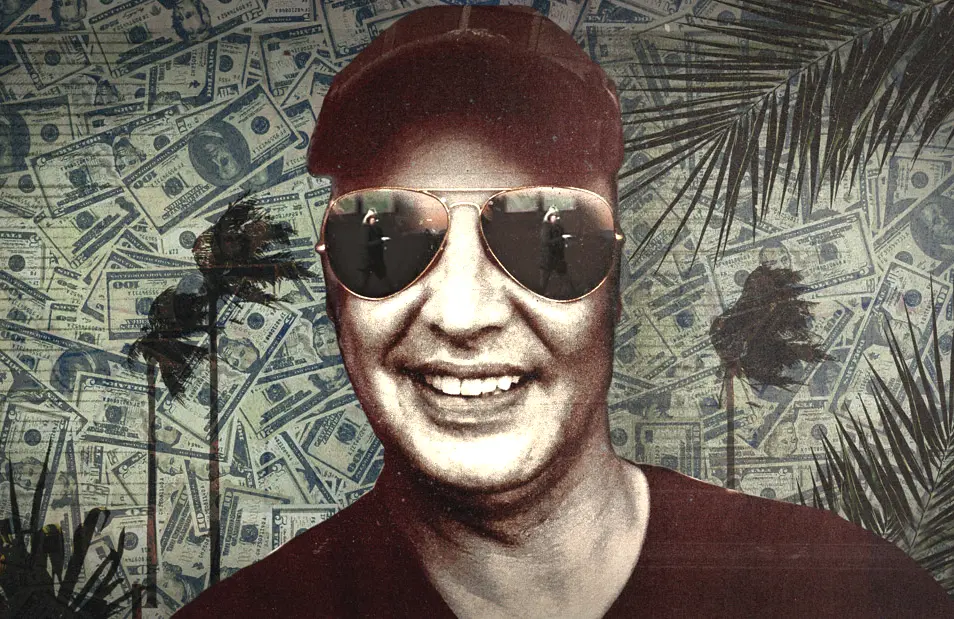Love Fraud is a Very Good Docuseries About a No-Good Dude
-
 Richard Scott Smith is the romantic conman at the center of Love Fraud. (Showtime)
Richard Scott Smith is the romantic conman at the center of Love Fraud. (Showtime)The editor-in-chief of the daily true-crime review newsletter Best Evidence, Sarah D. Bunting knows a thing or two about true crime. Her weekly column here on Primetimer is dedicated to all things true crime TV.
Before you settle in for Showtime's four-part series Love Fraud, I have two recommendations. The first is to take Showtime seriously in the documentary space. When it comes to premium-cable true-crime programming, HBO is everyone's first thought — and with good reason; their back catalog of Erin Lee Carr projects alone makes the network a must for true-crime audiences — but Showtime's offerings are just as worthwhile, from 16 Shots and Murder In The Bayou to the more recent Outcry and Ringside.
The second recommendation is for you not to Google the case at the center of Love Fraud before you watch. While you're watching, well, I'm not that worried, because I tore through the entire series in an afternoon... so I guess I have a third recommendation, and that's to watch them all in a row if you can. Showtime's been known to release limited series in their entirety to its streaming arms (as it did with Outcry); fingers crossed they do that with Love Fraud, which is a wild ride — and you won't want to get off or know what's coming.
Showtime's own press materials on Love Fraud describe it as following "(in real time) a con-man who is on the loose and the dynamic women determined to put him behind bars." Those dynamic women include the co-directors of the series, Heidi Ewing and Rachel Grady, who also made Jesus Camp, as well as Norman Lear: Just Another Version of You, an American Masters documentary about sitcom legend that I liked a great deal. Just Another Version of You had a framing gimmick I wasn't sure about until I realized how much more I liked it than the usual B-roll of a handful of photos, and Love Fraud has a similar interstitial device, animated collages by Martin O'Neill that more than ably replace the same-old drone shots and soft-focus crime-scene tape. Love Fraud has a certain wit to its soundtrack, too; a cliffhanger of sorts at the end of the second episode suggests that the con man, Richard Scott Smith, might decamp to Belize — followed by a smash cut into the credits accompanied by Rupert Holmes's "Escape (The Piña Colada Song)." The series takes its subject seriously, but not itself.
And what a unique subject, and an original way of tackling a crime story. Not only do the directors get amazing access to Smith's various victims, they also talk to his family members and people who believe Smith's assertions that he's the victim of a "witch hunt." And that hunt really does take place in real time, as the many traumatized girlfriends and fiancés Smith left in his wake band together on an internet message board, then contract the services of the next great American documentary character: Carla, a chain-smoking, F-bomb-dropping bounty hunter in Kansas City who's determined to help Smith's exes get better justice than supervised probation. Eventually, Love Fraud even gets Smith himself on camera, and it's a fearless master class in how to get a doc subject to expose himself as a sociopath... and how helpless a sociopath is to stop lying and manipulating, even when he's busted. It's fascinating.
The series isn't judgmental of the women Smith conned, repeatedly making the point in various ways that cons con and that Smith is very good at doing bad. At the same time, it's not exactly judgmental of Smith, either; it's clearly on the side of the so-called "revenge squad" and their efforts to stop his predations, but a number of interviews make it clear how Smith's emotionally torturous upbringing might have led him to turn out the way he did — without excusing his behavior. It's a tough balance to strike, as is deciding how much the directors should appear in a story that's still being written, but Love Fraud has a solid ear for how much we should hear from them as the narrative unfolds. And it's subtly great at giving a sense of what private investigators do day-to-day — how they think and work on an "operation" like this one. One member of the team talks about the position of Smith's rearview mirror and what it means, both as a reflection (so to speak) of Smith's self-absorption and how it affects the PI's ability to tail him effectively.
And the epilogue in the last episode... let's just say my notes at that point consisted of a series of exclamation points.
Love Fraud is like a mini-season of Catfish, but without all the filler, the overly choreographed "research," and the subjects who really only want to get on television. It's like Dirty John, but less violent (...mostly) and with more day-drinking and exploitive karaoke. (Trust me, this will all make sense.) Smart, exciting, and satisfying, Love Fraud is a great docuseries to end the summer on. Let's hope it also gets Showtime more of the respect it deserves in the genre.
Love Fraud premieres on Showtime Sunday August 30th at 9:00 PM ET
Sarah D. Bunting co-founded Television Without Pity, and her work has appeared in Glamour and New York, and on MSNBC, NPR's Monkey See blog, MLB.com, and Yahoo!. Find her at her true-crime newsletter, Best Evidence, and on TV podcasts Extra Hot Great and Again With This.
TOPICS: Love Fraud, Showtime, True Crime